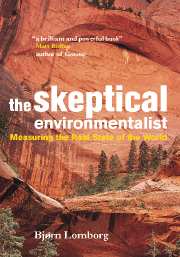Book contents
- Frontmatter
- Contents
- List of figures
- List of tables
- Preface
- Language and measures
- Acknowledgements
- Permissions
- Part I The Litany
- Part II Human welfare
- 3 Measuring human welfare
- 4 Life expectancy and health
- 5 Food and hunger
- 6 Prosperity
- 7 Conclusion to Part II: unprecedented human prosperity
- Part III Can human prosperity continue?
- Part IV Pollution: does it undercut human prosperity?
- Part V Tomorrow's problems
- Part VI The Real State of the World
- Notes
- Bibliography
- Index
7 - Conclusion to Part II: unprecedented human prosperity
Published online by Cambridge University Press: 05 March 2013
- Frontmatter
- Contents
- List of figures
- List of tables
- Preface
- Language and measures
- Acknowledgements
- Permissions
- Part I The Litany
- Part II Human welfare
- 3 Measuring human welfare
- 4 Life expectancy and health
- 5 Food and hunger
- 6 Prosperity
- 7 Conclusion to Part II: unprecedented human prosperity
- Part III Can human prosperity continue?
- Part IV Pollution: does it undercut human prosperity?
- Part V Tomorrow's problems
- Part VI The Real State of the World
- Notes
- Bibliography
- Index
Summary
We have experienced fantastic progress in all important areas of human activity. We have never lived longer – life expectancy has more than doubled during the past hundred years – and the improvement has been even more pronounced in the developing world. Infant mortality has fallen drastically. As recently as 1950 one in five infants died in the developing countries, whereas only one in 18 dies today – this is the same proportion as in the industrialized world just 50 years ago. We are taller and healthier and get fewer infections. There are far more of us, not because we have “started breeding like rabbits, but because we have stopped dying like flies.
At the same time we have more to eat. The proportion of people starving in the world has fallen from 35 percent in 1970 to 18 percent today and is expected to fall further to 12 percent by the year 2010. More than 2 billion more people get enough to eat and the average calorie intake in the developing world has increased by 38 percent.
Incomes in both industrialized and developing nations have at the same time tripled over the past 50 years and poverty incidence has decreased. The distribution of wealth between the world's richest and poorest has decreased slightly and it is likely to be reduced dramatically over the century.
- Type
- Chapter
- Information
- The Skeptical EnvironmentalistMeasuring the Real State of the World, pp. 87 - 88Publisher: Cambridge University PressPrint publication year: 2001



